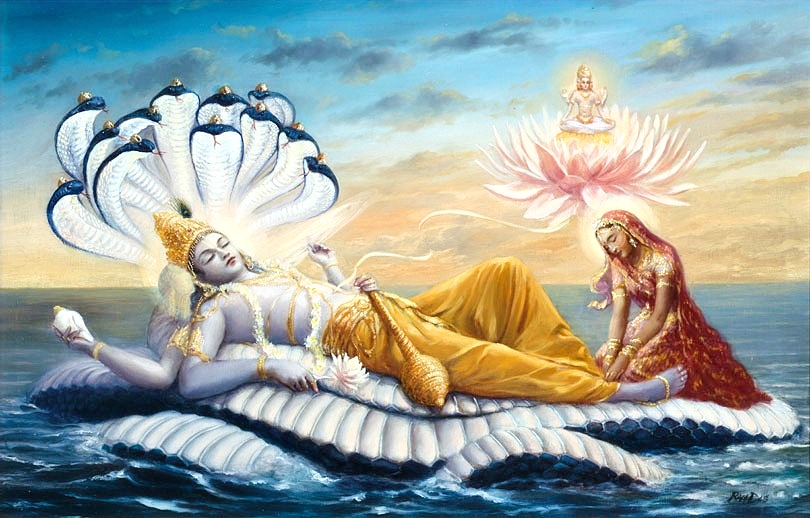
Amalaki Ekadashi
Feb - Mar
King Mandhata once said to Vasishtha Muni, “O great sage, kindly be merciful to me and tell me of a fast that will benefit me eternally.”
Vasishtha Muni said,
“The best of all fast days is Amalaki Ekadashi – also known as Phalguna-Shukla Ekadashi. He who faithfully observes a fast on this Ekadashi obtains enormous wealth, is freed of the effects of all kinds of sins, and attains liberation. I shall tell you the story of a hunter who, though daily engaged in killing innocent animals for his living, achieved liberation by observing a fast on Amalaki Ekadashi and following the prescribed rules and regulations of worship.
Once upon a time in the kingdom of Vaidisha, all the Brahmanas, kshatriyas, vaishyas, and shudras were equally endowed with Vedic knowledge and great bodily strength. The whole kingdom was full of Vedic sounds, not a single person was atheistic and no one sinned. The ruler of this kingdom was King Pashabinduka, also known as Chitraratha and was very religious and truthful. It is said that King Chitraratha had the strength of ten thousand elephants and that he was very wealthy and knew the six branches of Vedic wisdom perfectly.
Moreover, twice a month, everyone fasted on Ekadashi.
In this way, the citizens of Vaidisha lived for many long years in great happiness and prosperity. Once, in the month of Phalguna (February – March), the holy fast of Amalaki Ekadashi arrived, conjoined with Dvadashi. King Chitraratha realized that this particular fast would bestow an especially great benefit, and thus he and all the citizens of Vaidisha observed this sacred Ekadashi following all the rules and regulations.
After bathing in the river, the king and all his subjects went to the temple of Lord Vishnu, where an Amalaki tree grew. First, the king and his leading sages offered the tree a pot filled with water, as well as a fine canopy, gold, diamonds, and aromatic incense. Then they worshiped Lord Parashurama with these prayers: ‘Oh Lord Parashurama, Oh son of Renuka, kindly come beneath this holy Amalaki tree and accept our humble obeisances.’
Then they prayed to the Amalaki tree: ‘Oh Amalaki, Oh offspring of Lord Brahma, you can destroy all kinds of sinful reactions. Please accept our respectful obeisances and these humble gifts.’
After offering these prayers, King Chitraratha and his subjects remained awake throughout the night, according to the regulations of a sacred Ekadashi fast. It was during this auspicious time of fasting and prayer that a very irreligious man approached the assembly, a man who maintained himself and his family by killing animals. The hunter hid nearby, wondering what this extraordinary sight before him was. The hunter spent the entire night in great amazement as he watched the Ekadashi celebration and listened to the glorification of the Lord.
Soon after sunrise, the king and his royal retinue completed their observance of Ekadashi and returned to the city of Vaidisha. The hunter then returned to his hut and happily ate his meal. In due time the hunter died, but the merit he had gained by fasting on Amalaki Ekadashi and hearing the glorification of the Supreme Personality of Godhead, as well as by being forced to stay awake all night, made him eligible to be reborn as a great king endowed with many chariots, elephants, horses, and soldiers. His name was Vasuratha, the son of King Viduratha, and he ruled over the kingdom of Jayanti.
King Vasuratha was strong and fearless, he performed many kinds of sacrifices, and he always gave enough in charity. One day, while hunting in the jungle, King Vasuratha lost his way. Wandering for some time and eventually growing weary, he paused beneath a tree and, using his arms as a pillow, fell asleep. As he slept, some barbarian tribesmen came upon him and, remembering their longstanding enmity toward the king, began discussing among themselves various ways to kill him.
None of their weapons could even touch the sleeping king, and soon the tribesmen grew frightened. Suddenly a beautiful woman appeared from the king’s body, startling the tribesmen. Her eyebrows drawn in a mood of fierce anger, she looked like death personified. With her blazing chakra discus, she quickly killed all the tribal hunters, who had tried to slay the sleeping king.
Just then the king awoke, and seeing all the dead tribesmen lying around him, he was astonished. He wondered, ‘These are all great enemies of mine! Who has slain them so violently?’
At that very moment, he heard a voice from the sky: ‘You ask who helped you. Well, who is that person who alone can help anyone in distress? He is none other than Sri Keshava, the Supreme Personality of Godhead, He who saves all who take shelter of Him without any selfish motive.’
Upon hearing these words, King Vasuratha became over-whelmed with love for the Personality of Godhead Shri Keshava (Krishna). He returned to his capital city and ruled there like a second Lord Indra (king of the heavenly regions), without any obstacles at all.
“Therefore, Oh King Mandhata,” the venerable Vasishtha Muni concluded, “anyone who observes this holy Amalaki Ekadashi will undoubtedly attain the supreme abode of Lord Vishnu, so great is the religious merit earned from the observance of this most sacred fast day.”
Thus ends the narration of the glories of Phalguna-Shukla Ekadashi or Amalaki Ekadashi.